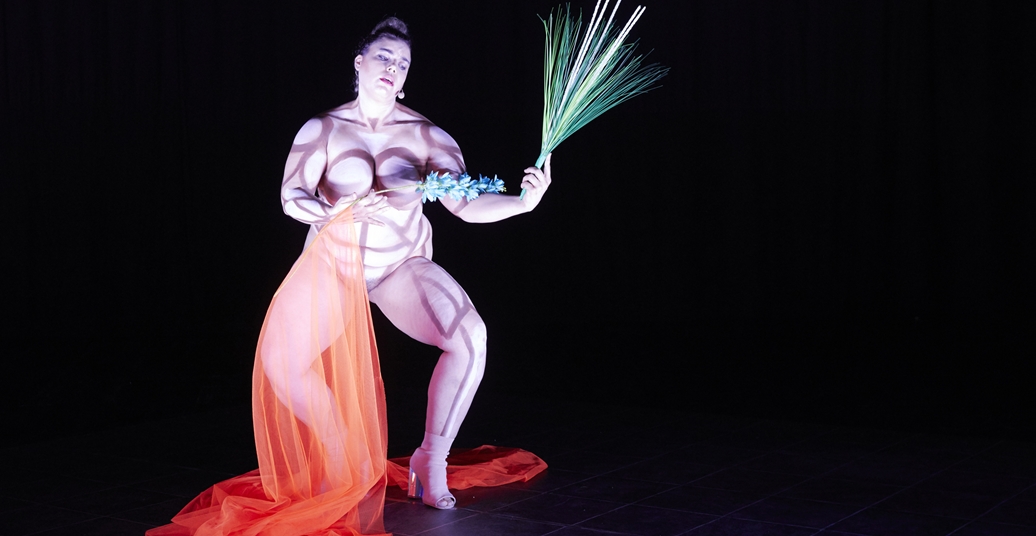Sorour Darabi’s “Savušun” and Teresa Vittucci’s “Hate Me, Tender” form a double bill to open the Queer Darlings festival at Sophiensæle, delivering timely truths laced with offbeat humour.
Sophiensæle’s Queer Darlings festival sets itself the task of presenting works that ‘unite queer and feminist perspectives on body and desire structures’. As well as being a bit of a mouthful to say, this is a challenging and complex ambition. Queerness often defines itself through indefinability, and there are an infinite number of views on how best to dismantle heteronormative structures. So how do we satisfactorily unite outlooks which can at times seem so scattered? This first double bill of the festival aims to do so by bringing together two works created by artists from disparate backgrounds, which nonetheless share a defiant rejection of dominant narratives, and a delight in subversion.
“Savušun” begins as Sorour Darabi, wrapped in a leather shawl, slips into the room from behind the audience and attempts to make her/himself heard over the chatter. S/he repeats a phrase in Farsi over and over again, but it takes a while before enough people notice, shush their neighbours, and silence finally falls. Had s/he walked out onto the stage as the houselights dimmed, the chances are that the well-behaved Berlin audience would have immediately known what to do. Right from the off, it seems that Darabi is choosing to deny both her/himself and the audience the distancing comfort of polite convention.
Darabi moves to the centre of the stage and removes the shawl, standing bare chested before us, a belt of long white candles strapped wick-down around her/his waist. As s/he begins to move, the search for meaning is rendered deliberately elusive; a mouth, seemingly open in ecstasy, morphs into a grimace of pain; wide staring eyes shift between aggression and alarm; the undulations of an expressively mobile torso blur the lines between flirtatious and desperate. Even the music is unsettlingly paradoxical, with the brutal crack of a whip rhythmically repurposed to form the most minimalist of techno soundtracks. The pervasive uncertainty and ambiguity make me feel as though the carpet is being pulled constantly from underneath my feet. By resolutely occupying the grey area and keeping things within a disorientating no-man’s land, is Darabi trying to recreate within us a hint of the fragility and instability experienced by minoritised bodies?
When Darabi sits and recites a text in French, like her/his movement, the words are rich and densely packed with contradictions. S/he describes an erotic awakening, contrasting uncomfortably incestuous overtones with humour and tenderness, destabilising notions of a common morality. I find it at first shocking, then revelatory, and, at the same time, wonder about those in the audience for whom the subject would be far more traumatic. One thing seems apparent – Darabi, having described her/his father’s tendency to use ‘epic artifice to cover vulnerability’, plans to do things differently. “Savušun” is an epic display of honesty, in which Darabi’s vulnerability is revealed in all its raw power, and its un-glamourised pain.
The first moments of “Hate Me, Tender” see Teresa Vittucci dressed only in a pair of pink heels, lying with a length of neon orange fabric draped over her body – a Renaissance nude taking a disco nap. Her bare skin is daubed with chalky markings, highlighting the muscle groups like on an anatomical model. Or do they signify a body prepared for dissection? With the fabric serving as a mantle, Vittucci uses her body to recreate religious iconography associated with the Virgin Mary, exaggerating the meek and pious facial expressions and repeatedly intoning, “O Virgin, you’re pure cos you’re a virgin”.
Abruptly breaking off from her chanting, Vittucci speaks directly to us, describing with dry wit her mother’s reaction to her plans for ‘the Mary piece’. Links are neatly drawn between historic and contemporary expectations placed on women with a sudden light-heartedness that catches me unawares. But why shouldn’t serious topics be discussed in a silly way? Taking two pot plants, Vittucci extends her arms into a sort of shaky semaphore, her body trembling wildly. To the sound of dark electronica, the stem of one of the plants becomes a machine gun, and, lying flat on her stomach, Vittucci’s screws up her face in a parody of fury. It is the first sign that this feminist quest might be fuelled by anger as well as humour.
Vittucci begins a hilarious deconstruction of the fetishisation of virginity, ironically arguing the case for contradictory standpoints, and using one of her boots as a substitute vagina and surreal learning aid. There are deft touches throughout; she briefly draws parallels between patriarchal ideas of male possession and colonial attitudes towards land occupation. Though this is a moment of brilliance, on which, perhaps, an entire work could be based, Vittucci breezily moves on. In a piece packed with ideas, none of them are laboured. It may only be the beginning of Vittucci’s research, but “Hate Me, Tender” already comes across as a riotously perceptive unpacking of the Madonna-whore complex.
The effectiveness of both these works appears to hinge on the creators making themselves vulnerable on stage, both performatively and personally. With queer bodies so often marginalised in our society, centring them unapologetically seems as brave as it is necessary. In Cruising Utopia: The Then and There of Queer Futurity (2009), José Esteban Muñoz wrote that ‘the future is queerness’s domain’, and that future may well depend on the courage and conviction of queer and feminist makers such as Darabi and Vittucci.




